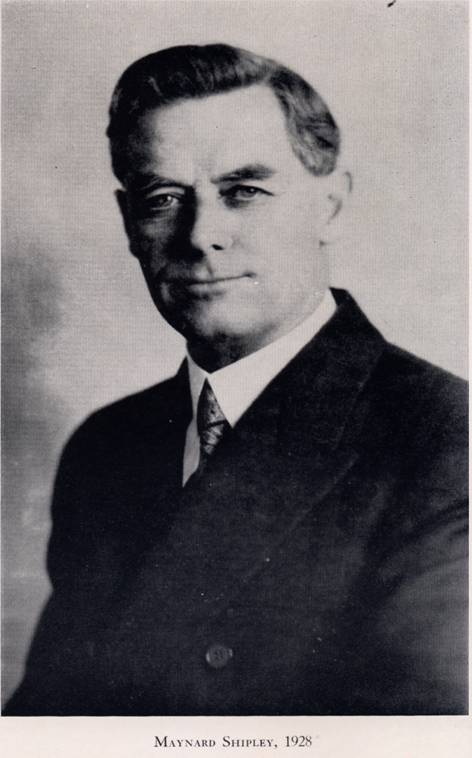
You remember the Science League of America, don’t you? Founded by the polymath Maynard Shipley (shown here) in 1924, it fought antievolution legislation, helped teachers discharged for teaching evolution, argued for evolution in articles and letters to the editor in magazines and newspapers, lectured and organized meetings all over the country, and basically served as “a vast clearing-house and information bureau” with respect to the teaching of evolution—the NCSE of its day, really, which is part of the reason that NCSE’s blog is named in its honor. Additionally, in 1925, the Science League of America conducted a prize contest on the evergreen topic, “Why Evolution Should Be Taught in Our Schools Instead of the Book of Genesis.” And thereby hangs a tale, which Shipley (partly) tells in The War on Modern Science (1927).
The topic of the contest was proposed, Shipley writes, by William Floyd of New York City, who also provided a prize of $50 (about $700 in today’s money) for the best essay. Floyd is otherwise unidentified in The War on Modern Science, but I feel confident that he was the freethought writer William Floyd (1871–1943), who edited the New York atheist magazine The Arbitrator, a publication devoted to “outlawing war, abolishing poverty, and unveiling superstition.” Later, Floyd wrote such books as Mistakes of Jesus (1932), Christianity Cross-Examined (1941), Humanizing Biblical Religion (1943), and—significantly—An Evolutionary Philosophy: A Substitute for Christianity (1930). He also tussled in court in 1940 with the creationist Harry Rimmer (1890–1952), which is amusing enough that it deserves a digression.
Rimmer was a biblical inerrantist, believing that the Bible is without error not only in matters of faith and morals, but also in matters of history and science. He was also a showman, and so, beginning in the 1920s, he offered $100 to anyone who could demonstrate a scientific error in the Bible. There were a lot of takers, but nobody collected. Two disappointed claimants went to court. In 1929, the first plaintiff challenged the veracity of Numbers 11:31 (which involves the miraculous appearance of a number of quail) on the grounds that the description entails that there were trillions of birds. He was unsuccessful. “Buoyed by their impeccable record after nearly a decade and a half,” Ronald L. Numbers writes in The Creationists (1992), “Rimmer and his fellow directors on the board of the Research Science Bureau upped the reward in 1939 to $1,000.”
The second plaintiff was Floyd, who claimed five scientific errors in the Bible: the six days of creation, the contradiction between the creation accounts in Genesis 1 and Genesis 2, the record of Noah’s ark, the quail of Numbers 11:31, and the descriptions of the camel, the coney, and the hare—all of which supposedly “cheweth the cud, but divideth not the hoof” and are therefore unclean—in Leviticus 11:4–6. (The five errors are given by Numbers; contemporary press reports say that Floyd claimed fifty-one errors, but I haven’t found a list.) After a two-day bench trial in February 1940, Judge Benjamin Halleck dismissed the case on the grounds that Floyd had failed to prove that the advertisement with the challenge to which he responded was placed or approved by Rimmer. Rimmer’s take was that the court had vindicated inerrantism.
Anyhow, fifteen years earlier, back in 1925, Floyd was willing to put up the stakes for the Science League of America’s essay contest. The judges for the contest are listed in the appendix to The War on Modern Science: James Rorty (1890–1973) was a writer, journalist, poet, and the father of the important American philosopher Richard Rorty; Arthur Preston Hankins (1880–1932) was a novelist and screenwriter, specializing in Westerns; and Miriam Allen deFord (1888–1975) was a journalist and novelist, specializing in mysteries and science fiction. DeFord was also, as it happens, the third wife of Maynard Shipley, whose biography she wrote: Up-Hill All the Way (1956). (It’s been a few years since I read the biography, but I recall thinking at the time that Shipley’s previous wives were not depicted sympathetically. Go figure.)
Also included in the appendix are the three prize-winning essays. The first, from Horace B. English, Professor of Psychology at Antioch College, offers as its answer, “because the evolution of our planet and its life-forms is the nearest approach to Truth of which we are now capable. To teach aught but the truth as we know it is the ultimate offense of any teacher.” The second, from Fay W. Clower, Professor of Sociology at the State College of Washington, contends that the evolutionary account is more successful, accords a greater degree of dignity to humanity, and offers a higher degree of hope for the future than the Genesis account. The third, from Truman G. Reed, the principal of the Central Intermediate School in Wichita, Kansas, argues that evolution is better suited than Genesis for preparing students in living in a changing world.
Not winning a prize was the entry that concluded, “Whatever good there is in Christianity comes from Jesus, this leader and teacher shattering the shackles of tradition. He invariably accepted the best explanation of facts, irrespective of tradition. Shall we train our students to do less? If, then, Evolution is the best explanation of the facts as to the existence of the earth, and the scholarship of the world is agreed as to this, then let Evolution be taught in the schools, in the place of the book of Genesis.” It seems like a shame. It’s a clever tactic, appealing to the precedent of Jesus’s rejection of tradition to argue for the rejection of the Genesis account, taken literally, in favor of evolution, and the odd restriction of “Evolution” to address only “the existence of the earth” is merely a minor glitch. Yet there was a good reason to reject the entry, as I’ll explain in part 2.

